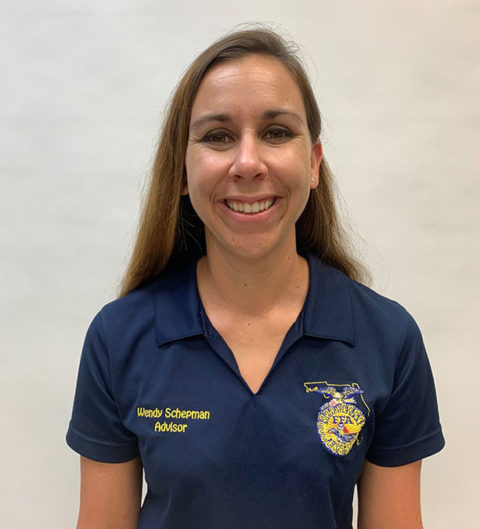“I try to be the teacher that always encourages and leads by example. If my students are pulling weeds, I am right there with them. If we are changing oil, I am on the ground with them. If we are walking the half-mile driveway to the school to trim trees, I walk with them. I believe that by teaching with humor and kindness, I can keep kids coming to school to continue learning.”
Wendy Schepman spent hours as a child working on her family’s small farm, and studying agriculture seemed a natural fit. As an officer in her high school FFA chapter, Schepman caught the teaching bug and went on to earn a bachelor’s degree in turfgrass science, where she was the only woman in the major. After graduation, Schepman became the first woman to work as a grounds crew member for the St. Lucie Mets, the minor-league baseball team in Port St. Lucie, Florida.
When Schepman learned that her former trades teacher at South Fork High School in Stuart, Florida was planning on retiring, she decided to obtain a teaching certificate. Soon, Schepman took over the landscape operations program at her alma mater, where she has taught for the past seven years in a classroom unlike any other: spread across 75 acres and including a three-hole golf course maintained by students, a workshop, an equipment barn, a nursery and an orchard. Living in a county with more than 160 golf courses, Schepman knows that her students can find employment if they know how to maintain grounds, irrigate them and provide other maintenance and services. “This is why I love teaching agriculture,” Schepman said. “I can incorporate all of my favorite things into one class and still be outside all day.”
Schepman’s curriculum, which offers students up to 18 dual-articulated college credits, teaches general agriculture and horticultural principles, moving on to design, installation, maintenance and mechanics. In Schepman’s outdoor classroom, students learn in a workplace-like setting, pursuing problem-solving by learning to do repairs on old, donated equipment. “Students light up when they finally get a mower started that has been in disrepair for a month,” Schepman said. She also strives to incorporate student interests into her classroom, like teaching hydroponics or how to build sprinkler systems.
Close connections with local industry—including through South Fork’s alumni network—help students access mentors and jobs. One alum, for example, is a John Deere mechanic who donates equipment to Schepman’s classroom for golf course construction and maintenance. The class also visits Orlando’s Landscape Show, the Golf Course Industry Show and the Sports Turf Managers Show, where they participate in quiz bowls, an opportunity generally reserved for postsecondary students. Schepman’s efforts have helped grow the program to require a second teacher for its 139 students.
Schepman was a finalist for the 2018 Harbor Freight Tools for Schools Prize for Teaching Excellence.
“My students often tell me that my class is the only reason they came that day or the only reason they enrolled in South Fork. If I make my class interesting enough that they never want to miss a day, they will subsequently end up going to more of their other classes such as English or math, which are needed to graduate.”
